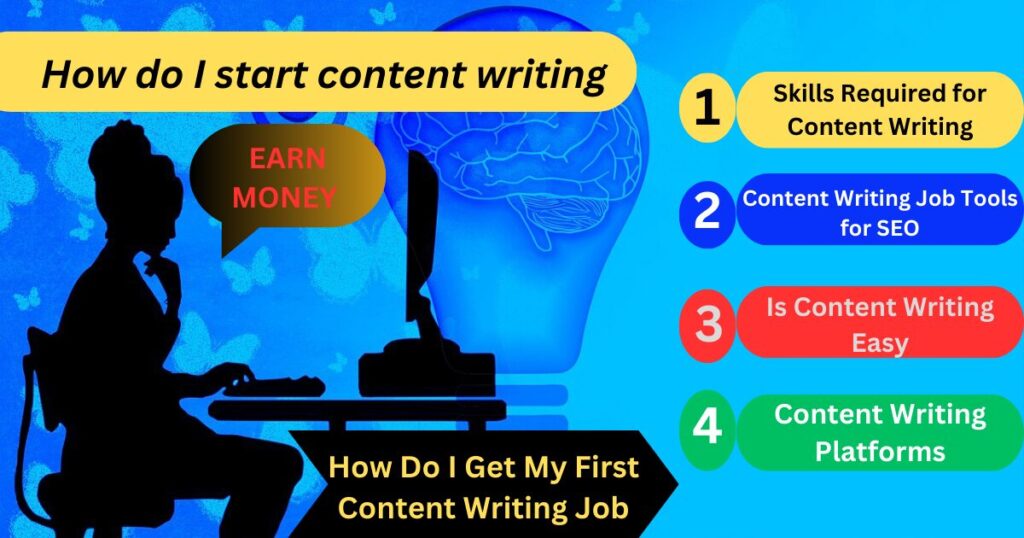
How do I Start Content Writing: A Step-by-Step Guide
Content Writing:
Introduction
Embarking on a journey into content writing can be both exciting and challenging. Whether you aspire to be a blogger, freelance writer, or content creator, this guide will provide you with a roadmap on how to start your content writing career.
1. Understanding Content Writing
Content writing involves creating engaging and valuable written material for various platforms. This can include blog posts, articles, social media content, and more. Understanding the nuances of effective content is crucial for success.
2. Skills Required for Content Writing
They explore the essential skills needed for content writing, including excellent writing skills, research proficiency, creativity, and the ability to adapt writing styles for different audiences and platforms.
3. Identifying Your Niche
Define your writing niche based on your interests and expertise. Specializing in a particular area can set you apart and attract a specific audience interested in your content.
4. Building a Writing Portfolio
Learn how to create a compelling writing portfolio to showcase your skills and attract believable clients or employers. A well-crafted portfolio is essential for establishing credibility.
5. Creating a Writing Routine
Establish a consistent writing routine to enhance productivity and creativity. Discover techniques to overcome writer’s block and maintain a steady flow of high-quality content.
6. Learning SEO Basics
I understand the fundamentals of Search Engine Optimization (SEO) to make your content more discoverable online. Learn how to incorporate relevant keywords and optimize your writing for search engines.

7. Utilizing Online Writing Tools
Explore various online tools and resources that can assist you in writing, editing, and optimizing your content. From grammar checkers to plagiarism detectors, these tools can enhance the quality of your work.
8. Networking and Collaboration
Build a network within the writing community by connecting with other writers, editors, and professionals in your niche. Networking can open doors to opportunities or collaborations.
9. Handling Feedback and Revisions
Develop the ability to receive constructive feedback and implement revisions effectively. This skill is crucial for continuous improvement and client satisfaction.
10. Freelancing Platforms and Job Boards
Discover popular freelancing platforms and job boards where you can find content writing opportunities. Learn how to create a compelling profile bid for projects successfully.
11. Staying Updated and Continuing Education
Stay abreast of industry trends and updates. Continuing education through courses, workshops, or reading is essential for honing your skills and adapting to evolving writing standards.
12. Content Writing Job Tools for SEO:
This article explores essential content writing job tools designed specifically to enhance your SEO efforts.
The Intersection of Content Writing and SEO
Understand the symbiotic relationship between content writing and SEO. Effective SEO practices can significantly boost the visibility and ranking of your content on a search engine, driving organic traffic to your website or platform.
- Keyword Research Tools. Delve into the world of keyword research tools that help you identify relevant and high-impact keywords for your content. Explore tools like Google Keyword Planner, SEMrush, and Ahrefs to refine your keyword strategy and improve your content’s search engine performance.
- Content Optimization Tools. Learn about tools that aid in optimizing your content for search engines. From on-page SEO suggestions to readability analysis, these tools ensure that your content is informative and engaging and aligns with SEO best practices.
- Grammar and Proofreading Tools. Discover grammar and proofreading tools that go beyond basic spell-check. Tools like Grammarly and ProWritingAid can help you polish your content, ensuring it is error-free, well-structured, and easy to read.
- Plagiarism Checkers. In maintaining the integrity of your content by using plagiarism checkers. These tools, such as Turnitin and Copyscape, ensure that your work is original and free from unintentional similarities to existing content.
- SEO Analytics and Tracking Tools. Explore analytics and tracking tools to measure the success of your SEO efforts. Platforms like Google Analytics and Moz provide insights into your content’s performance, helping you refine your strategy based on real-time data.
- Collaboration and Project Management Tools. Efficient collaboration is crucial, especially for larger content projects. Tools like Trello, Asana, or Slack can streamline communication and project management, ensuring that everyone involved in the creation of the content is on the same page.
- Social Media Schedulers. Recognize the impact of social media on content visibility. Social media schedulers like Hootsuite and Buffer enable you to plan and schedule social media posts, extending the reach of your content to a wider audience.
13. Is Content Writing Easy:
This article aims to unravel the complexities behind the seemingly straightforward world of content creation and provide insights into the skills and challenges that come with the territory.
The Facade of Ease: Common Misconceptions
Explore the common misconceptions that contribute to the perception of content writing as an easy endeavor. Unraveling these misconceptions is the first step in understanding the true nature of this craft.
- The Craftsmanship of Content Writing. Delve into the intricate art of content writing, emphasizing the importance of creativity, precision, and strategy. Content creation involves more than just putting words on paper; it’s about conveying ideas effectively to a specific audience.
- Challenges in Content Writing. Acknowledge the challenges that content writers face, including tight deadlines, fluctuating writing demands, and the need for continuous adaptation to evolving trends and algorithms.
- Developing Writing Skills. Highlight the essential writing skills required for content creation, including grammar, style, and tone. Discuss how honing these skills is an ongoing process that distinguishes proficient writers from novices.
- Understanding Your Audience. Emphasize the significance of audience awareness in content writing. Crafting content that resonates with a specific target audience requires a deep understanding of their preference, needs, and behaviors.
- Research Skills and Fact-Checking. Examine the role of research in content writing. Discuss the importance of fact-checking and ensuring the accuracy and credibility of information presented in written content.
- Adaptability to Various Styles and Niches.
- Explore the versatility demanded in content writing. The ability to adapt writing styles and cater to diverse niches is a skill that sets successful content writers apart.
- Time Management. Address the time constraints associated with content writing. Efficient time management is crucial for meeting deadline without compromising the quality of the content produced.
- Tools and Resources for Content Writing. Introduce various tools and resources that can aid content writers in their craft, from grammar checkers and plagiarism detectors to keyword research tools and content management systems.
14. What Qualification Required For Content Writer:
In this article, we’ll explore the qualifications and attributes that make an individual well-suited for a career as a content writer.
- Educational Background for Content Writing. Discuss the various educational paths that can lead to a career in content writing. While a specific degree may not be mandatory, certain fields such as English, journalism, communications, or marketing can provide a strong foundation.
- Key Writing Skills. Highlight the essential writing skills that every content writer should possess. This includes proficiency in grammar, punctuation, and the ability to craft engaging and clear narratives.
- Research Skills. Emphasize the importance of research skills in content writing. A content writer should be adept at gathering information from various sources and synthesizing it into coherent and well-supported pieces.
- Understanding SEO Basics. Introduce the basics of Search Engine Optimization (SEO) and its relevance in content writing. Knowledge of SEO practices helps writers create content that is not only compelling but also discoverable on search engines
- Industry Knowledge and Specialization. Discuss the value of industry knowledge and specialization. Content writers who understand specific industries can create more targeted and relevant content for their viewers.
- Portfolio Development. Explain the significance of building a strong portfolio. A portfolio showcases a writer’s best work and provides potential employers or clients with tangible evidence of their writing capabilities.
- Soft Skills: Communication and Creativity. Explore the importance of soft skills in content writing, including effective communication and creativity. Strong communication skills are crucial for understanding client requirements, while creativity allows writers to bring a unique perspective to their work.
- Adaptability and Learning Agility. Highlight the dynamic nature of content writing and the need for writers to be adaptable and open to continuous learning. The ability to adapt to different styles, tones, and subjects is a valuable skill.
- Networking and Collaboration. Discuss the role of networking in the content writing profession. Building connections with other writers, editors,
and editors and Industry professionals can open doors for cooperation and development. - Certifications and Courses for Content Writing. Introduce various certifications and courses that aspiring content writers can pursue to enhance their skills. These may include courses on content marketing, copywriting, or digital marketing.

Content Writing
15. How Do I Get My First Content Writing Job:
This article provides an extended guide on how to land that crucial first gig in the world of content creation.
- Building a Strong Portfolio. Understand the importance of a compelling portfolio. Learn how to showcase your best writing samples, demonstrating your proficiency and versatility in different styles and topics.
- Creating a Professional Online Presence. Explore the significance of establishing a professional online presence. This includes having a well-crafted LinkedIn profile, a personal website or blog, and active engagement a relevant social media platforms.
- Networking and Building Connections. Recognize the power of networking in the content writing industry. Building connections with fellow writers, editors, and professionals can open doors to job opportunities or collaborations.
- Utilizing Freelance Platforms. Discover popular freelance platforms such as Upwork, Freelancer, or Fiverr. Learn how to create an appealing profile, write effective proposals, and bid for content writing projects.
- Applying to Content Mills. explore content mills as a starting point for gaining experience and building your portfolio. Understand the pros and cons of working content mills and how to leverage this experience for future opportunities.
- Pitching to Websites and Blogs. Learn the art of pitching your content to websites and blogs. Craft personalized pitches that showcase your expertise and align with the content needs of the target publication.
- Internships and Entry-Level Positions.
- Consider internships or entry-level positions in content writing. These opportunities can provide valuable hands-on experience or serve as stepping stones to more significant roles in the field.
- Showcasing Your Skills in Job Applications. Understand how to effectively present your skills and experiences in job applications. Tailor your resume and cover letter to highly your writing capabilities and relevance to the specific content writing job.
- Receiving and Handling Feedback. Be prepared to receive feedback on your work. Learn how to handle constructive criticism positively and use it as an opportunity for growth and improvement.
- Continuous Learning and Improvement. Acknowledge the importance of continuous learning in the dynamic field of content writing. Stay updated on industry trends, improve your skills, and consider taking relevant courses or certifications.
16. Content Writing Platforms:
This article navigates the diverse landscape of content writing platforms, providing insights into the various options available.
Diversity in Content Writing Platforms
Explore the richness of content writing platforms, ranging from traditional blogging spaces to advanced content management systems, freelancing platforms, and specialized environments tailored for specific writing niches.
- Blogging Platforms. Delve into popular blogging platforms such as WordPress, Blogger, and Medium. Understand how these platforms cater to writers of varying experience levels, providing easy-to-use interfaces for creating and publishing content.
- Content Management Systems (CMS). Examine broader Content Management Systems like WordPress (as a CMS), Joomla, and Drupal. These systems offer not just blogging capabilities but also comprehensive solutions for building and managing various types of websites.
- Freelance Platforms. Discover platforms like Upwork, Freelancer, and Fiverr that connect content writers with clients seeking freelance services. Assess the pros and cons of freelancing on these platforms, considering factors such as competition and payment structures.
- Specialized Writing Platforms. Explore platforms specifically designed for writers, such as Wattpad for fiction authors or Scripted for content creation. These platforms often cater to particular writing niches and provide unique opportunities for writers to showcase their work.
- Social Media Platforms for Content Writers. Recognize the function that social networking sites like Instagram, Twitter, and LinkedIn play in the world of content creation. Discover the best ways for authors to use these platforms for networking, audience development, and promotion of their written work.
- Collaborative Writing Platforms. Learn about the programs and resources that support group writing projects. Multiple authors can collaborate in real-time on the same document using tools like Google Docs and Quip, encouraging teamwork.
- Self-Publishing Platforms. Explore self-publishing platforms like Amazon Kindle Direct Publishing (KDP) and Smashwords. These platforms empower writers to independently publish and distribute their work in various digital formats.
- Tools and Resources for Content Writers. Introduce various tools and resources that can enhance the content creation process. From grammar checkers to keyword research tools, writers can leverage a range of resources to improve the quality and visibility of their content.
- Choosing the Right Platform for Your Needs. Discuss factors to consider when selecting a platform for content creation. Tailor your choice based on your writing goals, target audience, preferred writing style, and the level of control you desire over your content.
17. What is The Highest Paid Job in Content Writing:
This article explores the highest-paid job roles within the realm of content writing and the factors that contribute to their lucrative nature.
Understanding Content Writing as a Lucrative Career
Establish the premise that content writing is not just an avenue for artistic expression but can also be a financially rewarding career, especially in certain specialized roles.
- Highest-Paid Content Writing Roles. Highlight various roles within content writing that are known for offering higher-than-average compensation. This section sets the stage for an in-depth exploration of each role.
- Content Strategist. Define the role of a content strategist and how their ability to align content with business goals and target audience needs can command a higher salary.
- Technical Writer. Examine the technical writing role, emphasizing the demand for professionals who can translate complex technical information into accessible and user-friendly content.
- UX (User Experience) Writer. Explore the emerging role of UX writers who play a crucial part in shaping the user experience through the design of clear and effective content in digital products.
- Corporate Copywriter. Discuss the responsibilities of corporate copywriters, especially those working for large companies or in industries where precise and persuasive communication is paramount.
- SEO Specialist. Unveil the importance of SEO specialists in the digital landscape and how their skills in optimizing content for search engines contribute to high-paying positions.
- Digital Marketing Manager. Examine the broader role of digital marketing managers who oversee content strategy as part of a comprehensive digital marketing plan.
- Content Director or Head of Content. Explore leadership roles within content teams, such as Content Directors or Heads of Content, who are responsible for shaping and executing content strategies at an organizational level.
- Freelance Copywriting for High-Profile Clients. Discuss how freelance copywriters can command high rates, especially when working with prestigious clients or on projects with a significant impact.
- Factors Influencing High Pay in Content Writing. Examine external factors such as industry demand, competition, and the overall economic landscape that contribute to the high pay in certain content writing roles.
- Skills and Qualifications for High-Paying Content Writing Jobs. Discuss the specific skills and qualifications that are often prerequisites for securing high-paying content writing positions.
- Networking and Reputation Building. Highlight the importance of networking and building a strong professional reputation in the content writing industry, which can lead to opportunities for higher-paying roles.
Conclusion
Summarize key takeaways and encourage aspiring content writers to persevere, stay curious, and embrace the learning process. Starting a content writing career is a journey; success is attainable with dedication, continuous improvement, and passion.






.png)
